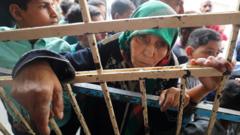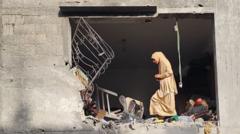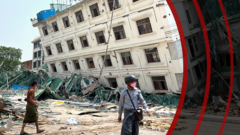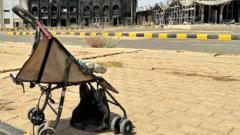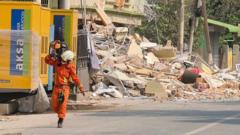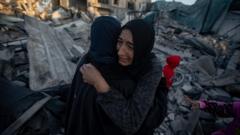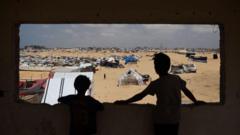As humanitarian aid dwindles in Gaza, residents like Bilal AbuKresh face extreme hardship, compounding the humanitarian crisis exacerbated by the closure of essential bakeries.
Desperation Mounts in Gaza as Bakeries Close Amid Aid Crisis

Desperation Mounts in Gaza as Bakeries Close Amid Aid Crisis
Residents scramble for flour as U.N. closes bakeries, exacerbating dire humanitarian conditions.
In a grim turn of events, the United Nations has shuttered 25 bakeries in Gaza due to shortages of flour and fuel, leaving desperate residents in a tenuous situation. Bilal Mohammad Ramadan AbuKresh, 40, has experienced profound losses, including his home and family, and now faces the possibility of losing his only source of reliable food.
“Before I stood in line for hours at the bakery, now all I have is a tent in a camp,” he lamented as he described the chaotic scenes following the bakery closures. The lines for bread had transcended mere inconvenience; they transformed into what he described as “the Day of Judgment.” Previously,at least bread was an affordable meal option, unlike the $30 bag of pasta he recently purchased to feed his children.
In response to unrelenting Israeli restrictions on aid deliveries and the deteriorating humanitarian conditions, competition for food has led to not only rising prices, but also instances of violence among desperate buyers. With the bakeries closed, AbuKresh has resorted to extreme measures to secure food for his children, including selling family heirlooms and gathering trash to sell for immediate cash.
“I risk death a hundred times just to get a bag of bread for my children,” he expressed in a moment of anguish and resilience. His story underscores the urgent need for enhanced humanitarian assistance to Gaza, where people are grappling not just with the tangible hardships of war, but also with the crushing weight of food insecurity.
“Before I stood in line for hours at the bakery, now all I have is a tent in a camp,” he lamented as he described the chaotic scenes following the bakery closures. The lines for bread had transcended mere inconvenience; they transformed into what he described as “the Day of Judgment.” Previously,at least bread was an affordable meal option, unlike the $30 bag of pasta he recently purchased to feed his children.
In response to unrelenting Israeli restrictions on aid deliveries and the deteriorating humanitarian conditions, competition for food has led to not only rising prices, but also instances of violence among desperate buyers. With the bakeries closed, AbuKresh has resorted to extreme measures to secure food for his children, including selling family heirlooms and gathering trash to sell for immediate cash.
“I risk death a hundred times just to get a bag of bread for my children,” he expressed in a moment of anguish and resilience. His story underscores the urgent need for enhanced humanitarian assistance to Gaza, where people are grappling not just with the tangible hardships of war, but also with the crushing weight of food insecurity.







